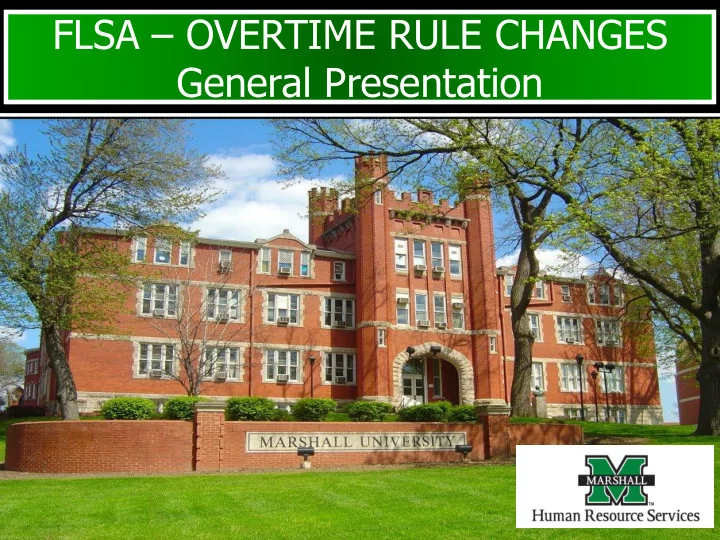

FLSA – OVERTIME RULE CHANGES General Presentation
DOL VIDEO – “SUMMARY”
FAIR LABOR STANDARDS ACT (FLSA) FLSA - First enacted in 1938, established tests that must be met in order for an employee to be exempt from overtime pay eligibility. Tests/Rules for classifying covered employees as “exempt” or “nonexempt” Requires overtime compensation to nonexempt employees for all hours over 40 in a workweek Usually 1.5 times regular pay rate – Government Agencies can award Compensatory Time.
WHAT ARE THE 2016 OVERTIME CHANGES? Raised minimum salary required for employee to be classified as exempt from overtime Salary minimum nearly doubled From $455 weekly ($23,660) To $913 weekly ($47,476) The minimum salary threshold will be automatically updated every three years to remain at the 40th percentile of the overall labor market. (starting 2020) NOT pro-rated for part-time Changes effective DECEMBER 1, 2016
HOW DOES THIS CHANGE IMPACT MARSHALL UNIVERSITY? INCREASED nonexempt/HOURLY (overtime eligible) employees MANAGERS will have to manage overtime more closely. Overtime will need to be approved and budgeted in advance. EMPLOYEES converted from Exempt to Hourly will have to be paid for all hours worked over 40 in the work week. This may also include compensatory time. Checking email and doing work outside of the normal work schedule will change the way these converted employees accomplish the “day to day” work after December 1, 2016.
HOW DOES THIS CHANGE IMPACT MARSHALL UNIVERSITY? Converted employees are now eligible for overtime They must track hours worked in WTE (WebTime Entry) Some will be issued a “PURPLE TIME SHEET” until converted over to WebTime Entry. Clock in & out, track all hours worked, observe start/stop times, observe meal & break periods. Overtime for work over 40 hours per week will be paid on a PAR, until the University is processing payroll in-house.
EMPLOYEE CLASSIFICATIONS NOT EFFECTED BY THE CHANGE Teaching Faculty (Adjuncts, Full Time, Tenured, Instructional) Graduate Assistants (Graduate Teaching Assistant) Resident Assistants Research Assistants Postdoctoral Fellows (Primary Teaching Duties Only) Faculty Coach (recruiters only are effected) Nonexempt employees (Hourly Employees) BUSINESS AS USUAL
EMPLOYEE CLASSIFICATIONS IMPACTED BY THE CHANGE Current Exempt employees who are paid under $47,476 annually and fall within one or more of the below classifications. Non-teaching faculty Researchers Librarians Administrators Staff PG 16 & Above (pending duties test) Non-Classified Employees
EMPLOYEES’ MAY MAINTAIN EXEMPT CLASSIFICATION… 1. In order for exempt employees to maintain an exemption status they must meet both the “salary” & “duties” test. 2. Duties Test - the employee’s job duties must primarily involve executive, administrative, professional, computer or outside sales duties (also known as “white collar” duties). 3. Salary Basis/level Test - the employee must be paid a predetermined and fixed salary that is not subject to reduction because of variations in the quality or quantity of work performed.
EMPLOYEES’ MAY MAINTAIN EXEMPT CLASSIFICATION…continued 4. The employee must be paid $47,476 or more annually. 5. Must satisfy the HR duties test assessment worksheet. 6. Must receive approval on HR Exemption Justification Worksheet. 7. Must satisfy an overtime assessment. 8. Must have an updated job description/PIQ. 9. Must have Senior VP and freeze committee approval. 10.Applies to each position individually based on duties and responsibilities.
PLAN of ACTION 1. Provide list of all exempt jobs in question to VP’s 2. Default “convert all jobs to HOURLY” (Non -Exempt) 3. Notify employees and supervisors of classification changes. 4. Provide instructions to VP’s to challenge the change… • Must justify salary increase to meet “salary test” • Must satisfy the “duties test” • Must do overtime & job assessment • Must have job description and/or PIQ’s updated 5. Train Managers and Employees
PLAN of ACTION…continued 6. Evaluate status of impacted positions Convert the position/employee to hourly and limit the work to 37.5 hours per week and/or pay some overtime but annual salary remains close to the employee’s regular salary. Increase employee salary to $47,476 to avoid higher salary cost due to the inability to avoid overtime. Hire additional employees to offset overtime and avoid increasing salary to $47,476. Cost of additional hires must still be less than paying the overtime or increasing salaries to satisfy the “salary test” . Departments must manage overtime and it must be approved in advance.
PLAN of ACTION…continued 7. Human Resource Services is working closely with internal partners (The Division of Finance, Payroll, Budget Office, Office of the General Counsel, Office of the Academic Affairs and University Communications) to create a comprehensive implementation, compliance, and communication plan.
TIME MANAGEMENT NON-Exempt Employees All hours over 40 in the workweek are eligible for 1.5 times salary or compensatory time paid. All hours over 37.5 in the workweek are eligible for 1.0 times salary or compensatory time paid. The workweek is currently Sunday through Saturday. When we transition to biweekly it will move to Saturday through Friday. Employee can’t voluntarily opt -out of getting overtime compensation We will discipline repeat offender who work overtime without approval after receiving notification Managers are responsible to ensure employees are working as directed & reporting time properly
MANAGE OVERTIME NON-Exempt Employees Establish procedures and Expectations 1. Overtime approval processes 2. Rules for working and tracking hours worked outside of normal workday. 3. Flex Time – may be used to avoid accruing overtime (within workweek) 4. Overtime Compensatory Leave – May be used to reduce overtime costs 5. “Unauthorized” work performed (with or without Supervisor’s knowledge) is subject to disciplinary action. 6. Be cautious to employee who arriveto work early and work late.
TRAVEL NON-Exempt Employees Employees who travel during the workday must be paid. Employees must be paid for time spent working regardless of location or time of day. Includes after hours work from home/hotel (emails/texts/calls) NOT PAID Regular travel to and from work “Downtime” while away from home Time spent as a “common carrier” passenger after working hours
____________________
Recommend
More recommend